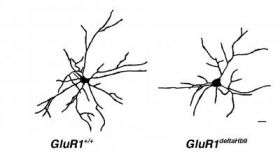Protein shown to play a key role in normal development of nervous system

A protein that enables nerve cells to communicate with each other plays a key role in controlling the developing nervous system. Research into how that protein helps precise connections to form among nerve cells may provide a basis for eventual treatments for patients who suffer injuries to their nervous system, including spinal cord injury.
"This expands our basic knowledge of how the nervous system develops in animals and humans," said study leader Robert Kalb, M.D., a neurologist at The Children's Hospital of Philadelphia. Kalb and colleagues published two studies in the Journal of Neuroscience.
The first study, published Oct. 1, showed that the protein GluR1, which is a receptor for the neurotransmitter glutamate, promotes the growth of dendrites, both in nerve cell cultures and in the nervous system of mice. Dendrites are branching extensions of nerve cells that carry signals into the cell. The most vigorous dendrite growth occurs shortly after birth, when GluR1 is present on the surface of the cell. As neurons mature, GluR1 is lost from the cell surface of some neurons, and dendrites stop growing.
Kalb and colleagues showed that suppressing GluR1 activity reduced dendrite growth, and led to poor development of connections between neurons. As a result of these defects, mice displayed less strength and less endurance on treadmill tests. On the other hand, using genetic manipulation that led to cell surface expression of GluR1 protein in adult mice led to supernormal motor performance, as shown by longer duration on treadmills.
"Our observations could be relevant to helping patients recover motor function after they suffer an injury to the spinal cord or other parts of the nervous system," said Kalb. "Often neural circuits remain intact after an injury, and are capable of reorganizing themselves, given the proper stimulation. If we can eventually manipulate this protein's activity in neurons, we might enhance communication among those neurons, and allow patients to receiver greater benefit from therapeutic exercises."
The second study by Kalb and colleagues, published Oct. 8, described the molecular pathways by which GluR1 binds with another protein, SAP97, to control dendrite growth during the early postnatal period. "Our work suggests that GluR1 brings the scaffolding protein SAP97 to the membrane of nerve cells, where it can receive pro-growth signals to build dendrites."
Although both studies were performed in mice, the neurodevelopmental process is considered to be similar for all mammals. "The first few weeks of postnatal life are a critical period for sculpting the architecture of the nervous system," added Kalb. "Greater understanding of how neural architecture develops normally may give us insight into how to intervene when things go wrong."
Source: Children's Hospital of Philadelphia





















